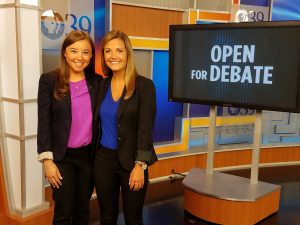“Editing Life” Broadcast
Open for Debate
 Lafayette College Students Explore New Gene Editing Technology with PBS39 Broadcast
Lafayette College Students Explore New Gene Editing Technology with PBS39 Broadcast
Easton, Pa. — Imagine being able to change the future by altering DNA right now. With the discovery of a new genetic technology called CRISPR-cas9, it’s possible. But, how should this ground-breaking tool be used, and what are the potential consequences?
This topic will be explored in depth by Lafayette College students in a brand new program called Open for Debate, which will broadcast on PBS39 on Tuesday, May 2 at 7:30 p.m.
“What is really exciting about this show is that it is the first in a completely new series,” said Nicole Crain. “We kept the best elements of what we’ve done in the past and extended the collaboration between students, faculty, and PBS39 professionals. This episode of Open for Debate steps to the leading edge of gene editing technology and examines its dramatic implications.”
“We are honored to partner with Lafayette College on our ninth student-learning initiative together,” said PBS39 Chief Executive Officer Tim Fallon. “This partnership continues to give our future leaders a voice in public media.”
About 50 students from multiple majors were involved in the production, which was led by Professors Mark and Nicole Crain’s courses in policy studies and economics. Students explored topics like CRISPR’s ability to cure genetic diseases, how the technology can aid in the production of biofuel, and how to regulate CRISPR and use it ethically.
The broadcast features an exclusive interview with Dr. Jennifer Doudna of the University of California Berkeley. As the co-discoverer and champion of CRISPR-cas9, Dr. Doudna has been named one of TIME’s 100 Most Influential People. Hannah Doherty ’19, a policy studies major from New Jersey and Danielle Wolff ’17, a neuroscience major from New Jersey, conducted the interview at The Franklin Institute in Philadelphia.
“As I talked to Doudna, I really gained the sense that she wants CRISPR-cas9 to be broadly discussed and debated so it may be used for the betterment of society,” Doherty said. “She wants the science to be an open discussion for all, and this show brings Lafayette students deeply into that discussion.”
Wolff said the opportunity to speak with Doudna, hailed by many as a potential Nobel Prize winner, was a remarkable experience.
“Dr. Jennifer Doudna is not only an amazing scientist and innovator, but also a kind and compassionate woman. She took the time to explain how CRISPR technology works and enthusiastically answered a multitude of questions from Lafayette students,” Wolff said.
Open for Debate provides a distinctive learning opportunity for Lafayette students to address complex topics at the intersection of business, policy, and technology.
“We demand high-level scholarship and communicate findings through the visual media. Working with PBS39 Executive Producer Laura McHugh offers a rare opportunity for students to meet this challenge,” said Mark Crain.
The 30-minute program is anchored by Doherty and Natalie Gosnell ’18, a policy studies and Spanish double-major from Maryland.
“Working with PBS39 and other Lafayette students for the inaugural edition of Open for Debate has been an extremely eye-opening experience,” said Gosnell. “Throughout this process, I have learned the importance of collaboration and determination. Everyone involved has to pull together in order to create an amazing product, which is exactly what we did.”